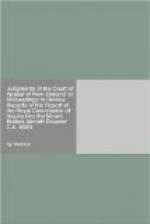What was in dispute in the argument in this connection was principally whether the order is so linked with the challenged findings in the Report that if those findings are invalid for excess of jurisdiction or breach of natural justice the order will fall with them. There was a subsidiary argument about whether the order was in any event invalid because the amount may greatly exceed the maximum allowed by the long out-of-date but still apparently extant scale prescribed in 1903 (1904 Gazette 491). We propose to consider the main argument, however, and in doing so to confine attention to whether there is a sufficient link between the order and the main findings complained of in the Report, those in paragraph 377.
At the beginning of his reasons for ordering costs the Commissioner expressed the opinion that the power should be exercised whenever the conduct of a party at the hearing has materially and unnecessarily extended the duration of the hearing. His following reasons include criticisms of the management of the airline for prolonging the hearing, and it was contended before us by Mr Baragwanath that they go no further. We are unable to accept that contention. In reciting the circumstances leading to the orders for costs the Commissioner expressly includes the chief executive’s order for documents to be destroyed and says, “The cards were produced reluctantly, and at long intervals, and I have little doubt that there are one or two which still lie hidden in the pack”. We think that such language would naturally be understood by a reasonable reader to refer back to the matters more fully developed in the section of the Report headed “The stance adopted by the airline before the Commission of Inquiry”, a section culminating in paragraph 377 with its references to “a pre-determined plan of deception ... an attempt to conceal a series of disastrous administrative blunders ... an orchestrated litany of lies”. The impression almost inevitably created is that, to adapt words used by Williams J. delivering the judgment of this Court in Cock v. Attorney-General (1909) 28 N.Z.L.R. 405, 421, the judgment for costs was in fact, though not in name, a punishment. The reasons given for the costs orders have definite echoes of paragraph 377 and the immediately preceding paragraphs. The airline was being required to pay costs, and not for delaying tactics simply. A significant part of the reasons was that in the view of the Commissioner its chief witnesses had been organized to conceal the truth.
It is true that, on purely verbal grounds, refined distinctions can be drawn between the sections of the Report dealing with the airline’s stance at the inquiry and with costs; but we have no doubt that their overall effect is that most readers would understand them as closely associated. It follows, we think, that if the findings in paragraph 377 are invalid for excess of jurisdiction or breach of natural justice they should be seen as playing a material




